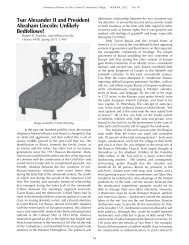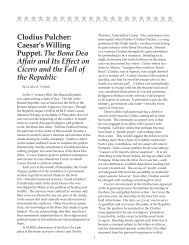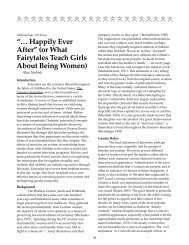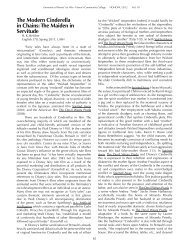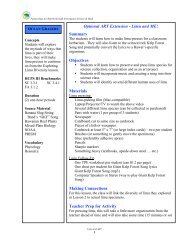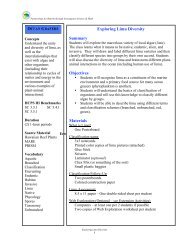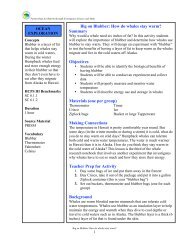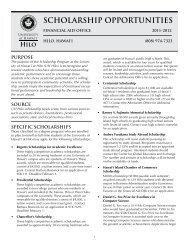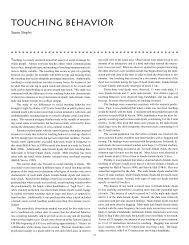A JOURNAL OF ACADEMIC WRITING VOLUME 8
A JOURNAL OF ACADEMIC WRITING VOLUME 8
A JOURNAL OF ACADEMIC WRITING VOLUME 8
You also want an ePaper? Increase the reach of your titles
YUMPU automatically turns print PDFs into web optimized ePapers that Google loves.
2008). Their decision contained a number of points: 1) The<br />
2001 Executive Order was not authorized by Congress, 2)<br />
the military commissions as proposed by President Bush were<br />
“structurally and procedurally deficient” and, 3) all detainees<br />
held at Guantánamo Bay (including al-Qaeda) are protected<br />
by the Geneva Conventions (Cutler 2008:36). The Supreme<br />
Court Justices agreed that Hamdan should be tried by a<br />
“regularly constituted court” that affords “judicial guarantees<br />
[…] recognized as indispensable by civilized peoples” (Cutler<br />
2008:38). They did not address the individual habeas claim but<br />
rather regulated the ability of the Executive branch to develop<br />
military commissions without Legislative action (de Londras<br />
2008).<br />
As a reaction to the Hamdan decision, Congress enacted<br />
the Military Commissions Act (MCA) of 2006 to codify how<br />
the Geneva Conventions are applicable to suspected terrorists<br />
and to establish new rules for military commissions for the<br />
prosecution of detainees (Cutler 2008). The MCA revoked<br />
the right of the US Supreme Court to enforce the Geneva<br />
Conventions and instead offered examples of what constituted<br />
a “grave [breach]” of the Conventions (Cutler 2008:43). The<br />
guidelines for military commissions used relaxed due process<br />
considerations concerning the admissibility of evidence.<br />
Hearsay and evidence obtained through coercion is admissible if<br />
the presiding judge affords it “probative value,” and defendants<br />
are not allowed to hear classified evidence against them; rather,<br />
they are provided with a “declassified summary of information”<br />
(Cutler 2008:40). The MCA also includes an explicit provision<br />
stripping federal courts of the jurisdiction to hear pending<br />
habeas cases (de Londras 2008).<br />
Colonel Morris D. Davis (2007) defends the MCA and<br />
argues that the trials conducted exceed the standards set forth<br />
by other formal UN tribunals. Furthermore, the procedures<br />
utilized in military commissions meet the requirements outlined<br />
in the Hamdan decision. Davis (2007) concedes that some due<br />
process standards in the MCA are broader than those used in<br />
civilian courts, but the same rights afforded US citizens are not<br />
automatically warranted in the case of “alien unlawful enemy<br />
combatants” (p33).<br />
In 2007, the US Court of Appeals for the D.C Circuit<br />
refused to grant a writ of habeas corpus in the case of<br />
Boumediene v. Bush (Boumediene) citing lack of jurisdiction<br />
under the MCA (Cutler 2008). Moreover, since the detainees<br />
were foreign nationals held outside the US they lacked a<br />
constitutional right to habeas corpus. After initially refusing<br />
to consider Boumediene, the US Supreme Court unexpectedly<br />
altered their decision and granted a review (Cutler 2008). De<br />
Londras (2008) believes this occurred out of a new willingness<br />
to finally settle the issue of constitutionality concerning habeas<br />
rights. Indeed, in June 2008 the US Supreme Court granted<br />
Guantánamo Bay detainees the constitutional right to the writ<br />
of habeas corpus (DoJ 2008). In their decision, the Supreme<br />
Court rejected the Bush Administration’s claim that the absence<br />
of US sovereignty negated the applicability of the Constitution<br />
(Boumediene v. Bush, 553 US 2008).<br />
The US Supreme Court’s decision necessitates close<br />
examination by the review panel President Obama has set up to<br />
determine the best course of action for closing the Guantánamo<br />
Bay facility within one year from the date he issued his<br />
Executive Order (January 22, 2009). As it stands, the Order<br />
leaves open the option of military commissions or some other<br />
trial mechanism, as well as the continued detention of some of<br />
the detainees (Wittes 2009).<br />
Ongoing debate reveals an interesting twist: during the<br />
Bush Administration liberal scholars advocated for POW status<br />
and conservative “hawks” argued against it; now, conservatives<br />
tend to favor a continuation of the provision of POW status<br />
and an improved mechanism for onshore preventive detention<br />
and liberals are clamoring for the transfer of the remaining<br />
detainees into the civilian criminal justice system. Nonetheless,<br />
liberals and conservatives alike are inclined to agree that<br />
President Obama needs to make a clean break from policies<br />
associated with President Bush and promote a greater balance<br />
between national security concerns and the humanitarian rights<br />
of detainees (Goldhaber 2009).<br />
President Obama appears to have taken steps to define<br />
a “new standard” for the detention of terrorist suspects and<br />
has revoked the phrase “enemy combatant” (DoJ 2009b).<br />
Individuals who “planned, authorized, committed, or aided”<br />
the attacks of September 11, 2001 will remain in detention,<br />
in addition to those who “harbored those responsible” (DoJ<br />
2009c:1). Members of al-Qaeda and the Taliban who engage<br />
in attacks against coalition forces in Afghanistan or provide<br />
“substantial support” from elsewhere will also be detained (DoJ<br />
2009c:7). The Department of Justice (2009c) has yet to define<br />
exactly what constitutes “substantial support,” but for now it<br />
will be determined on an individual basis depending on the<br />
facts of each case.<br />
The Obama Administration exhibits a greater willingness<br />
than the previous Bush Administration to ensure that the<br />
treatment of detainees is progressive with the nation’s values.<br />
The long-term, indefinite nature of the “War on Terror” invites<br />
the question of whether a war-like or military approach is best<br />
suited for the task of managing terrorist suspects. It is on this<br />
point that the Geneva Conventions, once seized upon by liberal<br />
scholars in defense of Guantánamo Bay detainees, begins to<br />
fade in significance.<br />
As previously noted, the Geneva Conventions were<br />
conceived in the context of two state actors in conflict. Al-<br />
Qaeda and deposed Taliban forces are non-state actors, meaning<br />
HOHONU Volume 8 2010 - 71



